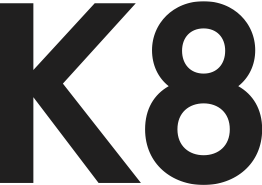Historically Labelled Living Labs
Since its formation in 2006 ENoLL has labelled 440+ Living Labs. See the full list of Labelled Living Labs who are not active members of the network.
 K8
K8
K8 explores the role of collaborative design methodologies in processes of organizational development. Building on the experimental cultures of art and design, K8 remains close to the peer-to-peer dynamics of the emerging digital society. A particular focus of its work is on bringing civil society organizations and social movement actors together with other public and private actors interested in the collaborative economy and new models of value accounting.
Founded in 2015, K8 builds on the methodological work conduced at the xm:lab – Experimental Media Lab of the Academy of Fine Arts Saar. The latter was founded in 2012 as institute for experimental education and arts-and-technology research; K8 was developed by people interested in organizing training, transfer, and think tank activities to share and expand these methods with a wider community. Over the past 3 years, K8 has attracted funding from a wide variety of sources to conduct over 50 individual projects with private and public organizations that involved different elements of our open innovation framework (which includes approaches from different design fields such as critical, game, people-centered, universal design). K8 is currently in the process of synthesizing and validating methodological outcomes across projects through the iterative development of a multidisciplinary “Collaboration Design Toolkit”.
Through its close cooperation with local stakeholders, K8 has access to a wide array of studio and workspace environments for creative production, testing, and other living lab activities (green box / markerless motion captur systems for digital production, media facade, game lounge designed to facilitate iterative software and design development, fablab for digital fabrication, audio, photo, and video studios).

K8 Principles
With roots in the holism of arts and culture approaches, K8 has from the beginning embedded questions of innovation in the broader context of a collaborative engagement with environmental, social and economic transformation. Above and beyond the cooperation with state actors and SMEs, K8’s engagement with collaborative economy issues reflects an interest in civil society and social movements as innovation actors. These actors strive to combine the dynamics of peer production with the cultural, economic and social concerns of cooperativism, and aim to create new models of digital labor to unleash a cross-sectoral innovation dynamic of cooperative governance in the digital economy.
K8 acknowledges that acknowledges that the ethos of cooperativism shapes not only the organization of collaborative research and development, but also the design of technical systems to address the growing interest of consumers in transparent and trusted data-driven digital economy models. Integrating open technologies and the concerns of open societies, cooperativism exemplifies the dynamics of open and social innovation in the collaborative economy and combines technological and non-technological innovation in unique ways that deserve to be explored as models of economic development. This is a key area for K8 in the further development of its stakeholder network and methodological approaches.
Since its formation in 2006 ENoLL has labelled 440+ Living Labs. See the full list of Labelled Living Labs who are not active members of the network.